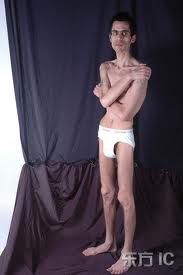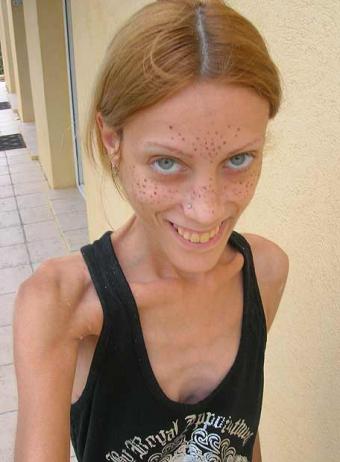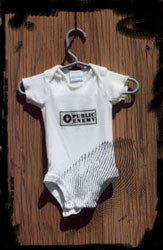
|
A DARK SUBCULTURE Most people reading this will probably be familiar with how these websites work. Largely aimed at girls, they take the idea that anorexia is a lifestlye choice, not an illness, and suggest dangerous diet plans accompanied by photographs of thin celebrities and models (sometimes doctored to make them appear even thinner) as "thinspiration.”
They are sometimes written in a derogotary, abusive style designed to wear away the users already low self-esteem. (Examples: “Before eating anything, ask yourself: ‘Do I need this?’ The answer is always no – do 200 press ups to punish yourself for even thinking this.” “Breakfast? You don’t even deserve to be awake, never mind eating.”) The information on such sights is also often inaccurate, for example saying that the user should take caffeine pills instead of vitamins as they “have less calories.” Vitamin pills, in fact, contain no calories. The sites are female centric in terms of the “thinspiration”, but the advice they offer could be adopted by either gender. And male thinspiration is growing- many male sufferers have begun to log on and request such images, as well as many women posting them in the first place. It is a great concern of mine that eventually, male users of these sites will eclipse female users. This is not because I think male eating disorders will eventually have a higher occurrence than females, but because these sites are often used as an outlet for those with no were else to turn – and whilst, this is changing, a male eating disorders sufferer is more likely to go without the required help and support. Many live for years, undiagnosed and silently suffering. When I wrote my first essay for REPEAT “The Politics of Flesh,” in my analysis of “The Holy Bible” I chose to tackle Richey Edwards anorexia nervosa upfront – the issue seems to be neglected in favour of his self-mutilation when it comes to media musings on his general pain. The female anorexics who write on “pro-ana” message boards may claim that they do not want help, but if they are true sufferers then one day they will be grateful for it. Many men do not even get that privilege. I say “genuine sufferers” because such sites are largely used by “wannarexics.” Whilst it seems hard to believe that this could ever be a word (my spell checker has inevitably thrown up its wiggly red line) there are more of these than you might think – girls who claim that they want to become anorexic, and need some advice on starting out. When I think of the pain that I’ve witnessed, the idea that anybody could actually want this makes me feel ill. The term “controlled anorexia” is also being used, and it is not being limited to the subculture. Even The Times supplement featured an article in which the female writer wrote a sub section claiming to admire “controlled anorexics”, and saying it wouldn’t hurt for us to be more like them!
My friend had everything going for him. He was 22, had 4 A-grade A-levels and was excelling as a junior doctor (until he became to ill to work.) He yearned for freedom from his illness; he never found it. Every time somebody contemplates the idea of a “pro-ana” lifestyle, or dismisses the concept as harmless, they should think of somebody like him –and his grieving family and friends. After all, to quote Nicky Wire “Its like a slow death…any association with self-abuse and self-control is quite romantic in a naïve sort of way, but obviously, the reality of anorexia is much worse than the idea.” Amy Britton
|


